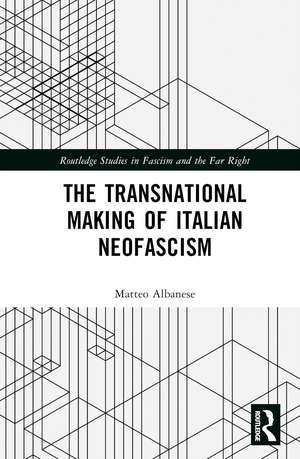The Transnational Making of Italian Neofascism: Routledge Studies in Fascism and the Far Right
Autor Matteo Albaneseen Limba Engleză Hardback – 26 noi 2024
It examines the transition from historical fascism to neo-fascism, highlighting the survival and adaptation of fascist ideologies within democratic frameworks. The book explores the formation and development of the Italian Social Movement (MSI) and the broader neo-fascist network, emphasizing its transnational connections and ideological persistence. Key themes include the escape and reorganization of former fascists, their influence on post-war Italian politics, and the cultural and ideological debates within the neo-fascist movement. The work also addresses the role of race, anti-communism, and the strategic alliances formed during the Cold War. By tracing the historical and ideological continuities, the book provides a comprehensive understanding of neo-fascism's enduring impact on Italian and global political landscapes.
It will be of interest to students and scholars of fascism, political history and Italian politics.
Din seria Routledge Studies in Fascism and the Far Right
-
 Preț: 310.33 lei
Preț: 310.33 lei - 9%
 Preț: 1003.31 lei
Preț: 1003.31 lei -
 Preț: 304.80 lei
Preț: 304.80 lei -
 Preț: 296.10 lei
Preț: 296.10 lei - 9%
 Preț: 935.56 lei
Preț: 935.56 lei -
 Preț: 281.99 lei
Preț: 281.99 lei -
 Preț: 198.31 lei
Preț: 198.31 lei -
 Preț: 309.56 lei
Preț: 309.56 lei -
 Preț: 280.83 lei
Preț: 280.83 lei -
 Preț: 311.41 lei
Preț: 311.41 lei -
 Preț: 324.25 lei
Preț: 324.25 lei -
 Preț: 295.40 lei
Preț: 295.40 lei -
 Preț: 311.03 lei
Preț: 311.03 lei - 9%
 Preț: 1005.78 lei
Preț: 1005.78 lei -
 Preț: 304.22 lei
Preț: 304.22 lei -
 Preț: 312.71 lei
Preț: 312.71 lei -
 Preț: 210.55 lei
Preț: 210.55 lei - 9%
 Preț: 936.45 lei
Preț: 936.45 lei -
 Preț: 297.78 lei
Preț: 297.78 lei -
 Preț: 302.89 lei
Preț: 302.89 lei - 9%
 Preț: 935.59 lei
Preț: 935.59 lei -
 Preț: 169.80 lei
Preț: 169.80 lei - 9%
 Preț: 1005.88 lei
Preț: 1005.88 lei -
 Preț: 201.15 lei
Preț: 201.15 lei -
 Preț: 287.27 lei
Preț: 287.27 lei -
 Preț: 202.62 lei
Preț: 202.62 lei -
 Preț: 154.97 lei
Preț: 154.97 lei -
 Preț: 315.92 lei
Preț: 315.92 lei -
 Preț: 311.33 lei
Preț: 311.33 lei -
 Preț: 278.97 lei
Preț: 278.97 lei -
 Preț: 310.31 lei
Preț: 310.31 lei -
 Preț: 152.78 lei
Preț: 152.78 lei -
 Preț: 288.41 lei
Preț: 288.41 lei -
 Preț: 319.01 lei
Preț: 319.01 lei -
 Preț: 296.29 lei
Preț: 296.29 lei - 18%
 Preț: 1000.27 lei
Preț: 1000.27 lei - 18%
 Preț: 1000.27 lei
Preț: 1000.27 lei - 18%
 Preț: 1000.27 lei
Preț: 1000.27 lei -
 Preț: 414.32 lei
Preț: 414.32 lei -
 Preț: 372.07 lei
Preț: 372.07 lei - 31%
 Preț: 767.07 lei
Preț: 767.07 lei - 25%
 Preț: 767.38 lei
Preț: 767.38 lei - 18%
 Preț: 1008.17 lei
Preț: 1008.17 lei -
 Preț: 374.87 lei
Preț: 374.87 lei
Preț: 934.94 lei
Preț vechi: 1027.40 lei
-9% Nou
Puncte Express: 1402
Preț estimativ în valută:
178.90€ • 187.26$ • 148.90£
178.90€ • 187.26$ • 148.90£
Carte tipărită la comandă
Livrare economică 31 martie-14 aprilie
Preluare comenzi: 021 569.72.76
Specificații
ISBN-13: 9781032805658
ISBN-10: 103280565X
Pagini: 196
Dimensiuni: 156 x 234 mm
Greutate: 0.45 kg
Ediția:1
Editura: Taylor & Francis
Colecția Routledge
Seria Routledge Studies in Fascism and the Far Right
Locul publicării:Oxford, United Kingdom
ISBN-10: 103280565X
Pagini: 196
Dimensiuni: 156 x 234 mm
Greutate: 0.45 kg
Ediția:1
Editura: Taylor & Francis
Colecția Routledge
Seria Routledge Studies in Fascism and the Far Right
Locul publicării:Oxford, United Kingdom
Public țintă
PostgraduateCuprins
List of key characters and biographies Chronology of events Introduction 1. Escapes and new shores 2. A community of believers and fighters: New Order 3. The neo-fascist youth and the call for a global traditionalist revolt 4. The last attacks, the defeat, and a new strategy Conclusions
Recenzii
‘This is a key book on the history of neo-fascism in Italy in a global context. As Matteo Albanese demonstrates, post-war fascists inhabited a transnational galaxy of overt enemies of equality and constitutional democracy. From terrorism to coup attempts and, at times finding common ground with the illiberal right and the State in the name of anti-communism, the paths of neo-fascists represented a complex history of adaptation to the Cold War global context, one where power was no longer in the present but in a then improbably new order. Their post-war transnational histories of acting within democracy in order to downgrade it, and ultimately to permanently subvert it in the future, shows important precedents for understanding our present.’
Federico Finchelstein, The New School for Social Research, USA
‘Matteo Albanese has written an important monograph on the transnational aspects of the far right which have implications on contemporary Italian as well as European politics.’
Andrea Mammone, Sapienza University of Rome, Italy
Federico Finchelstein, The New School for Social Research, USA
‘Matteo Albanese has written an important monograph on the transnational aspects of the far right which have implications on contemporary Italian as well as European politics.’
Andrea Mammone, Sapienza University of Rome, Italy
Notă biografică
Matteo Albanese is Professor of History of political parties and movements at the University of Padua, Italy. He is a researcher at the Institute of Social Sciences in Lisbon, after defending his doctoral thesis at the European University Institute. He has been a visiting scholar at Sciences-po, Paris and at the New School for Social Research in New York. He is the author of essays on political violence and extremism in Italy and abroad. His publications include Neofascism in Europe (1945–1989): A Long Cultural Journey (Routledge, 2023).
Descriere
This book delves into the evolution of Italian neo-fascism from the end of World War II to the mid-1970s. It examines the transition from historical fascism to neo-fascism, highlighting the survival and adaptation of fascist ideologies within democratic frameworks.
